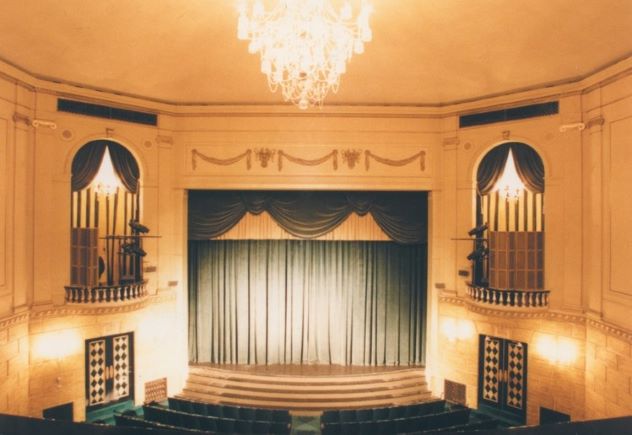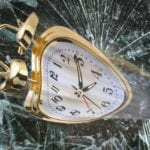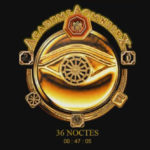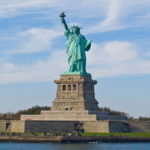 Weird Stuff
Weird Stuff  Weird Stuff
Weird Stuff  Movies and TV
Movies and TV 10 Weird Ways That TV Shows Were Censored
 Our World
Our World 10 Places with Geological Features That Shouldn’t Exist
 Crime
Crime 10 Dark Details of the “Bodies in the Barrels” Murders
 Animals
Animals The Animal Kingdom’s 10 Greatest Dance Moves
 Movies and TV
Movies and TV 10 Box Office Bombs That We Should Have Predicted in 2025
 History
History 10 Extreme Laws That Tried to Engineer Society
 History
History 10 “Modern” Problems with Surprising Historical Analogs
 Health
Health 10 Everyday Activities That Secretly Alter Consciousness
 History
History Top 10 Historical Disasters Caused by Someone Calling in Sick
 Weird Stuff
Weird Stuff 10 Wacky Conspiracy Theories You Will Need to Sit Down For
 Movies and TV
Movies and TV 10 Weird Ways That TV Shows Were Censored
 Our World
Our World 10 Places with Geological Features That Shouldn’t Exist
Who's Behind Listverse?

Jamie Frater
Head Editor
Jamie founded Listverse due to an insatiable desire to share fascinating, obscure, and bizarre facts. He has been a guest speaker on numerous national radio and television stations and is a five time published author.
More About Us Crime
Crime 10 Dark Details of the “Bodies in the Barrels” Murders
 Animals
Animals The Animal Kingdom’s 10 Greatest Dance Moves
 Movies and TV
Movies and TV 10 Box Office Bombs That We Should Have Predicted in 2025
 History
History 10 Extreme Laws That Tried to Engineer Society
 History
History 10 “Modern” Problems with Surprising Historical Analogs
 Health
Health 10 Everyday Activities That Secretly Alter Consciousness
 History
History Top 10 Historical Disasters Caused by Someone Calling in Sick
Top Ten Hauntings at the Theater
From the common saying of the phrase “Break a Leg” to the absolute refusal to mention a certain play involving certain witches and certain Scottish kings, theater folk are certainly superstitious folk. Then, it should come as no surprise that almost every live performance theater has a resident ghost.
Haunted hotels and spectral cemeteries often have a place center stage when it comes to the ghost hunting spotlight. But for this list of ten allegedly haunted theaters from around the world, it is time for the ghosts of actors and stagehands to finally come out from the wings.
Related: 10 Haunted School Stories That Made The News
10 The Oregon Shakespeare Festival in Ashland, Oregon
Built in 1935, the Oregon Shakespeare Festival isn’t just one stage; it is a collection of three different performance spaces that the Oregon Shakespeare Festival uses from February to October to put on around eleven plays a year. Though named after the Bard himself, the company has put on more than just Shakespearian productions since 1960. However, one Elizabethan thespian named Charles Laughton has been itching to perform his rendition of King Lear…even long after his tragic death in 1963.
Born in Scarborough, England, in 1899, Laughton became an actor at the age of twenty-seven, debuting on stage in the West End of London. Throughout the next thirty years, he would perform in Broadway shows and star in movies. But it wasn’t until 1961 that he would be able to fulfill his lifelong dream of playing King Lear, in the Shakespearian play of the same name, being put on at the Oregon Shakespeare Festival. He would also be starring as the comedic phony knight Falstaff in The Merry Wives of Windsor. Though sadly, in 1963, his dream would be snuffed out when he passed away from pancreatic cancer before being able to perform.
Or so people thought; the play, The Merry Wives of Windsor, would go on as planned, though many actors would claim to hear the disembodied, deep laughter of a Falstaff impersonator. Some even claimed to see a mysterious man dressed in the character’s garb backstage, even claiming that the mysterious new performer looked just like Charles Laughton!
The haunting wouldn’t end there, though. During King Lear, actors would claim to hear another disembodied voice, almost in anguish, and many would also claim to see Laughton spontaneously appear in the audience during (spoilers) Lear’s death scene. To this day, people claim to see the spirit of Laughton forlornly bemoaning his lost opportunity to play his dream role. He is also said to be particularly active and noisy during productions of King Lear.[1]
9 The Variety Theater in Cleveland, Ohio
Some theaters have a rich history of performances lasting longer than a century, but sadly, some fail to stand the test of time and fall into ruin. Such is the case with the Variety Theater in Cleveland, Ohio, which opened in 1927, putting on mostly Vaudeville-style variety shows, a la Ziegfeld’s Follies.
Throughout the years, though, the gorgeous-looking theater would start screening movies and even host concerts. However, one such concert, performed by the metal band Möterhead in 1984, would prove to spell the building’s doom. At a noise level of 130 decibels, Möterhead would actually break the world record that year with the loudest concert in the world, though this came at a cost. Plaster rained down from the ceiling as noise complaints and safety concerns would pour in from across the neighborhood. In 1986, the theater would close down for good, and still unrenovated, slowly morph into an urban explorer’s paradise.
Though abandoned, the building would not remain silent. Ghost Tour leader, Chuck Gove, claims that 19 different spirits haunt the abandoned stage. Though the space is closed to the public, Gove claims to see lights flash on and off and hear disembodied voices coming from backstage, almost sounding like the tech crew working. It is also claimed that the shadow of a man can be seen staring from the upper balcony with piercing, red eyes.[2]
8 The Kalamazoo Civic Theater in Kalamazoo, Michigan

Built in 1929, the Kalamazoo Civic Theater is one of the most prolific buildings in the Great Lake state’s city of Kalamazoo. The company has been delighting its audience with plays and musicals for more than ninety years, though one audience member may be more or less eternally bound to the building.
Her name is Thelma, and allegedly, she passed away after tragically falling to hear death from the upper balcony of the main theater—or so the legend goes. In truth, her name and backstory are only fabrications created by students attending the theater’s summer camp. Despite that, there is definitely something poltergeist-adjacent going on at the Civic, or so people claim.
Though activity mostly involves ghostly piano playing or singing in an otherwise empty building or the odd prop hidden in inexplicable locations, some sightings of Thelma take a more dramatic tone. During the company’s production of Singin’ in the Rain in the 1990s, actor Janet Gover claims that some unexplainable force was attempting to lift her hat off her head during a live show, a hat that was tightly pinned to her hair. She also claims to have seen the image of a woman in a black coat on a monitor standing onstage when nobody was actually in the space.
Another anecdote involves the prop master working backstage during the off-season. She spotted an older-looking woman in a black coat and poofy black hat at a point when nobody should have been backstage. The prop master asked the woman, “Oh, this is the backstage, are you lost?” to which the older woman responded, “Oh no, I know exactly where I am,” before disappearing before the prop master’s very eyes.[3]
7 The Palace Grand Theater in Dawson City, Canada
The first international entry on this list admittedly doesn’t take place too far away from the USA. However, one would definitely find this theater to be closer to Alaska than the Continental United States. Dawson City, located in the Yukon in western Canada, was a town that sprung up overnight due to the Yukon Gold Rush. The Palace Grand Theater, built in 1899, resulted from the rapid settlement of European settlers in the area. But by the time it was opened, the Gold Rush fever had died down, and the theater would draw an audience based on its reputation alone, usually with Follies-styled shows affectionately referred to as “The Good Time Girls.”
One of the alleged ghosts of the Palace Grand theater is none other than its very own founder, Arizona Charlie Meadows. Arizona Charlie was a showman of the same caliber as Buffalo Bill, and though he would pass away in the state he was named for, it is claimed that his ghost still haunts the Yukon.
Aside from the classic ghost fare—lights turning on and off after hours, the sound of loud footsteps, and cold spots—people report the scent of roses lingering in Charlie Meadow’s box. In addition, Emily Farrel, a stage manager, reported being in the upper balcony one night, watching a concert she was working on when a performer asked her who the man standing next to her was. He was wearing an old-fashioned jacket and hat. Farrel swears that there was no one else in the balcony next to her and never saw anyone else during the entire show.
Another spirit said to haunt the theater is a performer known as Klondike Kate. One of the most prolific “Good Time Girls” in Dawson City, Kate dressed as a man to cross the border into Canada and attempt to make a fortune in the Gold Rush City. She married three times and garnered a beloved reputation among the whole town before passing away in 1956. Not for naught, her former dressing room also smells of roses, but aside from that, her red-headed spirit is claimed to roam backstage, perhaps more than the specter of Arizona Charlie.[4]
6 Le Petit Theatre in New Orleans, Louisiana
In stark contrast to the cold north of the Yukon, this next theater, Le Petit Théâtre Du Vieux Carré, is located in the warm Gulf Coast city of New Orleans, in the state of Louisiana. Though the theater company was founded in 1916, the current building was built in 1922 and has produced shows ever since.
New Orleans is no stranger to ghosts, however, and one would be hard-pressed to call Le Petit an exception. Many deaths have occurred on the property, such as an actress tragically losing her footing from a high catwalk to a reluctant bride. The latter was to be married at the property before jumping to her death from an outdoor balcony. Both spirits have been reportedly sighted, namely the tragic bride, in the reflections of fountains.
There are also other spirits on the property: an old, crotchety theater manager who allegedly died from a self-inflicted gunshot wound and who has a tendency to slam doors and make props disappear. In addition, a specter known only as Caroline, who should an actor ask for her blessing, returns the props that the manager steals.
However, perhaps the strangest ghost on the property is the nameless phantom of a nun, who once slapped a crew member in the face, leaving a visible mark. The odd thing about that, though, is that the area has stark little history involving any nunneries.[5]
5 The Huguan Huiguan Opera House in Beijing, China
In Beijing, China, there is an opera house known as the Huguan Huiguan Opera House, or more simply, the Huguang Guild Hall. Built in 1807, the guildhall is known as one of the “Four Great Theaters of Beijing,” though it would moonlight as housing for poor victims of World War II. It is also, as some claim, incredibly haunted.
According to some legends, the philanthropist that renovated the Huguang Guild Hall neglected to discover that the new renovations would be built on an ancient cemetery. Because of this, people often report the sounds of wailing and screaming coming from the theater’s courtyard, even when the space is completely devoid of people.
A part of the legend also claims that if someone were to throw stones from within the courtyard, a disembodied voice would immediately scold the vandal, though no apparition would manifest to make good on its threats. A legend also states that a janitor hired at the facility was so plagued by leprosy that it caused the ghosts to appear in voice only, for they’d be too afraid to appear physically.
Nevertheless, the Huguan Huiguan Opera House is used to this day as both a functioning place for Chinese opera to be performed and a museum for Chinese opera in general.[6]
4 The St. James Theatre in Wellington, New Zealand
The next entry on this list involves quite a bit of a swim from the previous entry. In the capital of New Zealand, Wellington, lies the St. James Theatre, erected in 1912 and designed by the architect Henry Eli White. This theater was actually the second built in its space, the first being primarily a small house used for pantomime shows and variety acts. However, this new theater would be large enough to house 650 guests and put on both full plays and silent movies.
With a long history spanning almost a century, with the odd period of decline and restoration, it’s easy to imagine that this New Zealand theater would be a prime candidate for a haunting.
The leading spirit said to haunt the wings of this theater is named Yuri. According to legend, Yuri was a Russian performer who tragically fell from the flies, though it is unknown if this story is true or not, as there isn’t a date given for the tragedy. Others say that he was maliciously pushed by a jealous fellow actor named Pasha. Either way, it is claimed that lights will all come on after hours while maintenance finishes working. One employee was even pushed by an unseen force while holding his son, just as a steel beam was about to drop and hit his head.
Besides Yuri, people have also heard an odd, disembodied wailing woman (one such observer being the director Peter Jackson), an American actor by the name of Stan Andrews, and as some claim, an entire boy’s choir.[7]
3 The Theatre Royal, Drury Lane in London, England
Perhaps one of the most prolific West End theaters (London’s answer to Broadway) is the Theatre Royal, Drury Lane, most often referred to simply as “Drury Lane.” Though it is the second oldest standing building on this list so far, in that the current building known as Drury Lane was built in 1812, this rendition of the Theatre Royal is, in fact, the fourth of its name, with the first having a history stretching back to 1663.
The hauntings of Drury Lane involve Victorian-clad ghosts and other historical figures as well. By far the most prolific lingering spirit would be that of the famous clown, Joseph Grimaldi, as well as specter referred to only as “The Man in Grey,” a figure donning a tricorne hat and a powdered wig, along with other 18th century garb, who may have had his bones exhumed in the 1800s after a hidden wall was discovered by architects.
These apparitions appear in full quite often to the actors backstage, with it being claimed that the ghost of Grimaldi sometimes kicks and pulls on the hair of actors from beyond the veil, though more often as not, he is described as amiable.
It is also claimed that the spirit of Dan Leno, a pantomime clown who often dressed up as a woman for his acts, is spotted in costume, often leaving behind the scent of lavender.[8]
2 The New Amsterdam Theater in New York, New York
Any haunted theater list would be woefully incomplete without an entry from a theater on Broadway. The New Amsterdam Theater has a rich history of highly praised theatrical productions, starting its legacy in the year 1902. The space was used for many Shakespearian productions, as well as many early musical comedies, but perhaps the production that serves as the genesis of the New Amsterdam’s haunting would be none other than Ziegfeld’s Follies
The Follies were a popular type of show involving chorus girls performing musical numbers in lavish, complicated costumes, and Ziegfeld’s Follies, which ran from 1913 to 1927, were perhaps the most popular. That is where the character of Olive Thomas comes in. Thomas was a performer in the famous Follies who tragically overdosed on mercury bichloride in the year 1920 and has, as some claim, haunted the New Amsterdam ever since.
It didn’t even take long for Olive Thomas to begin her haunting, with some performers seeing her as early as the ’20s themselves; even people who knew Thomas personally would see her spirit and naturally become very, very confused.
Thomas is often seen as a brunette woman, dressed in a white dress, with a similarly white sash, carrying a bottle of pills. She treads across the stage, sometimes speaking to no one in particular, and often disappears into walls or travels up a nonexistent stairway. She is also often sighted in the hidden trapdoor beneath the stage. Thomas also has a tendency, allegedly, to appear in the dressing rooms in a green, beaded dress, even occasionally flirting with actors on the odd occasion.[9]
1 The Belasco Theater in New York, New York
And so, one last entry from the Great White Way rounds out this list. David Belasco was a director, producer, and playwright, and perhaps, the ghostly spirit most adamant about spending the rest of his life (well, afterlife) in the place that he loved more than anything: the theater.
The Belasco Theater, then known as the Stuyvesant Theater, when Belasco was alive to manage it, was built in 1906 and has been a mainstay on Broadway to this day. David Belasco, also known as “The Bishop of Broadway,” worked at his new theater, as well as others, until his passing in 1931.
Perhaps through sheer passion for the theater, the alleged ghost of Belasco has often been spotted in full clarity, without any transparency or fading in and out of existence. It is especially easy to identify him, for the Bishop of Broadway often unironically wore a priest’s habit, a “habit” that Belasco’s spirit has kept going. He would often be spotted by actors, watching the show from the balcony. And on some occasions, a man in priestly garb would appear backstage and shake the hands of actors, congratulating them for their performance.
Other haunted happenings include a random scent of cigar smoke, seemingly coming from nowhere, along with the sound of disembodied laughter, and occasionally the sound of a full party going on in Belasco’s old, locked-off penthouse suite. The Bishop isn’t alone in the theater of his namesake, either. Allegedly, the spirit of a “Blue Lady” appears in a frosty mist from time to time, traipsing about backstage or in the wings. But by and large, David Belasco is the most reported ghost in any theater by far, with sightings of him even taking place in the 2010s.[10]








